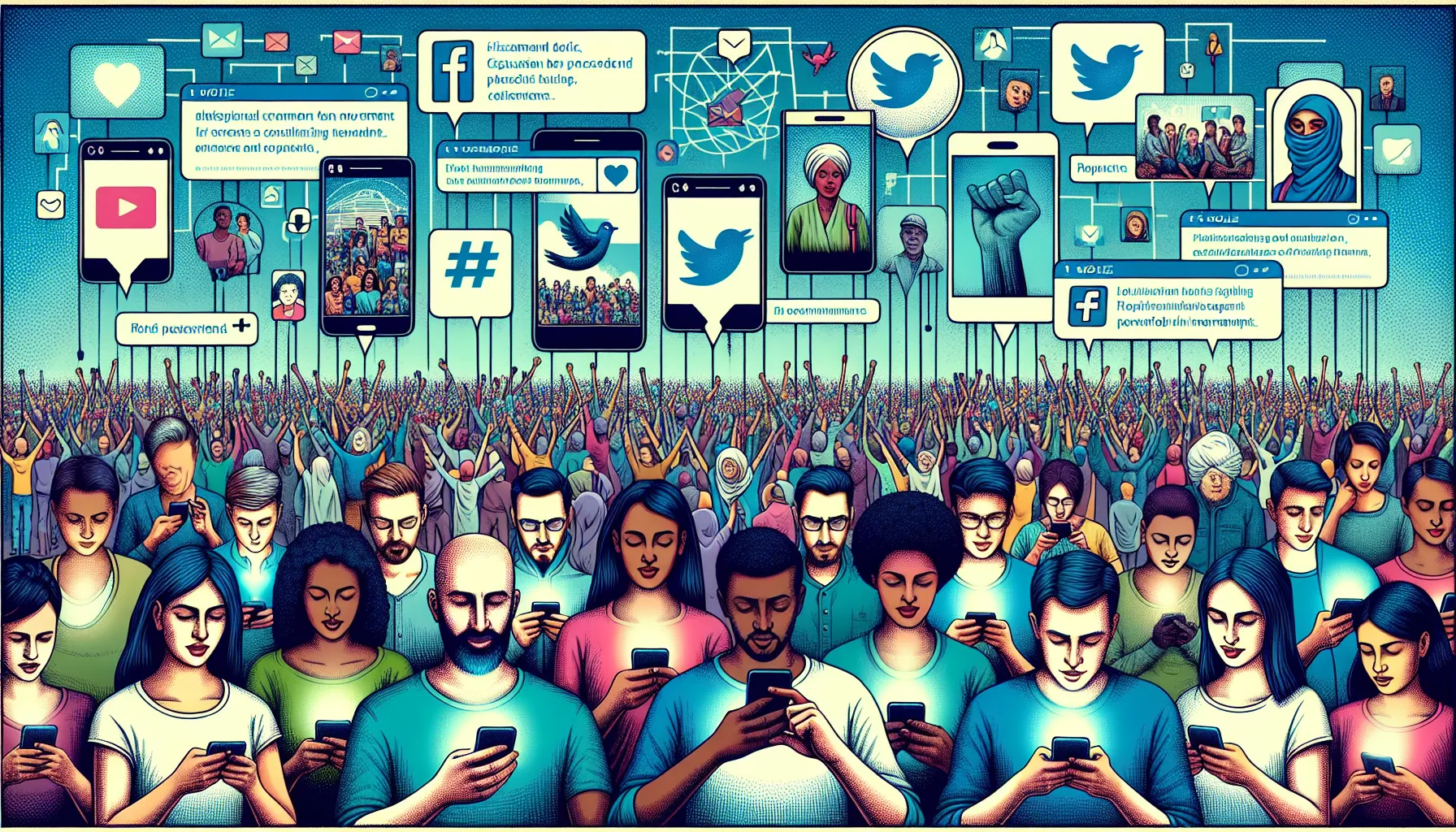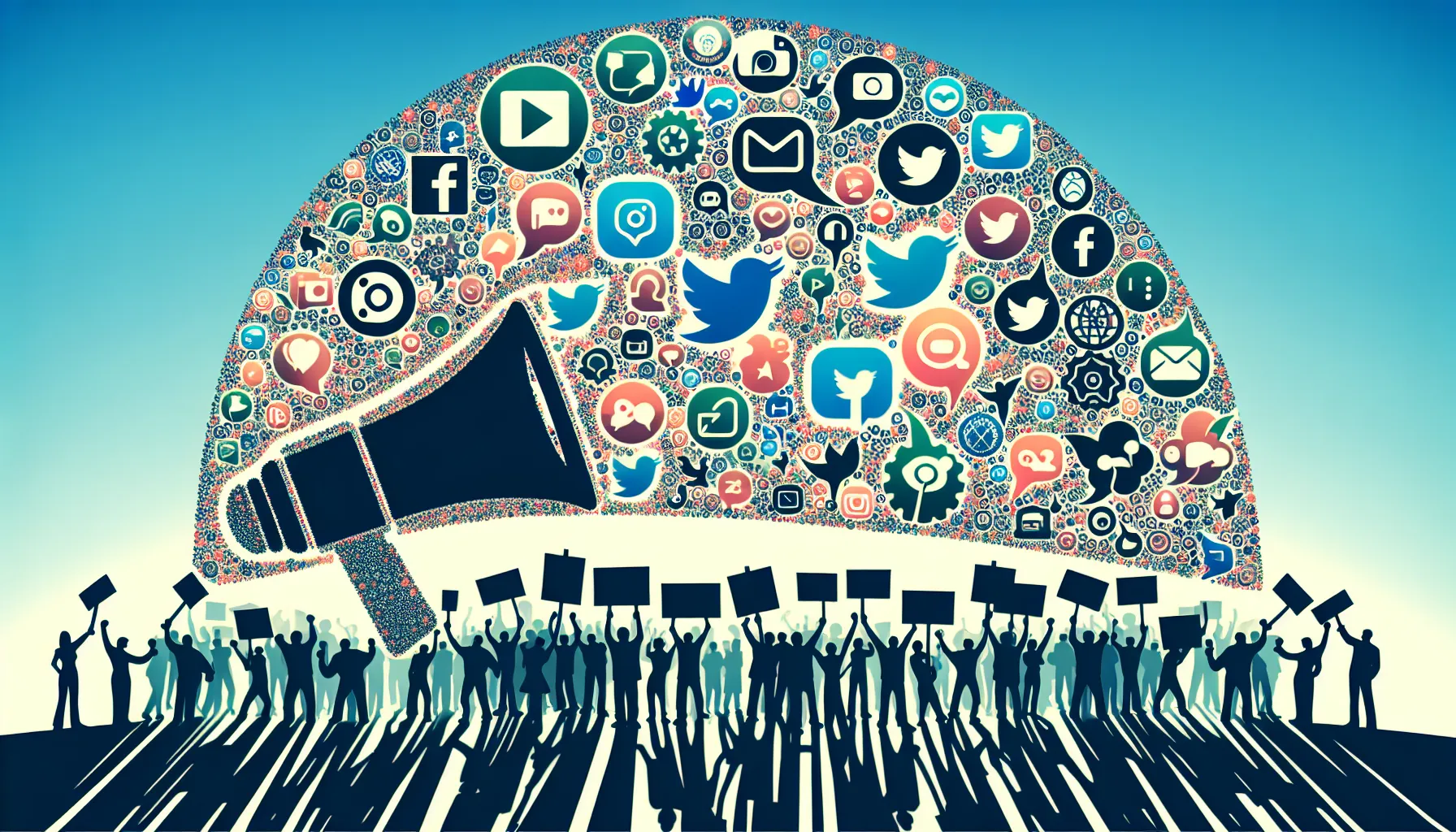Social media’s impact on political movements has become a recurring theme in IELTS Writing Task 2 essays. This topic’s relevance in today’s digital age makes it a popular choice for examiners, appearing frequently in recent years and likely to continue in future tests. Let’s explore this subject through sample essays targeting different band scores, providing valuable insights for IELTS candidates.
Analyzing the Essay Question
Let’s examine a typical IELTS Writing Task 2 question on this topic:
Some people think that social media plays a crucial role in modern political movements, while others believe its impact is overrated. Discuss both views and give your own opinion.
This question requires candidates to:
- Discuss the perspective that social media is crucial for modern political movements
- Explore the viewpoint that social media’s impact on political movements is exaggerated
- Provide and justify their own opinion on the matter
Now, let’s look at sample essays for different band scores, followed by detailed analyses.
Sample Essay for Band 8-9
Social media platforms have undeniably transformed the landscape of political activism in the 21st century. While some argue that these digital tools are instrumental in shaping modern political movements, others contend that their influence is exaggerated. This essay will examine both perspectives before presenting my own stance on this contentious issue.
Proponents of social media’s significance in political movements highlight its unparalleled ability to mobilize large groups rapidly and cost-effectively. Platforms like Twitter and Facebook enable activists to disseminate information, organize protests, and rally support on a scale previously unimaginable. The Arab Spring of 2010-2012 serves as a prime example, where social media played a pivotal role in coordinating demonstrations and spreading awareness both locally and globally. Furthermore, these platforms provide a voice to marginalized groups who may lack access to traditional media outlets, thus democratizing political discourse.
Conversely, skeptics argue that the impact of social media on political movements is often overstated. They contend that while online activism may generate significant buzz, it frequently fails to translate into meaningful real-world action – a phenomenon dubbed “slacktivism.” Critics also point out that social media can be a double-edged sword, as governments and opposing groups can use the same platforms for surveillance, disinformation campaigns, and manipulation of public opinion. Moreover, the echo chamber effect of social media algorithms may reinforce existing beliefs rather than foster genuine dialogue and change.

In my view, while the influence of social media on political movements should not be overstated, its role as a catalyst for political engagement and change cannot be dismissed. The key lies in recognizing social media as a powerful tool that complements, rather than replaces, traditional forms of political activism. When used strategically in conjunction with on-the-ground organizing and sustained effort, social media can significantly amplify the reach and impact of political movements.
In conclusion, social media has undoubtedly reshaped the landscape of political activism, offering unprecedented opportunities for mobilization and expression. However, its effectiveness ultimately depends on how it is leveraged alongside other forms of political engagement. As technology continues to evolve, the interplay between social media and political movements will likely remain a dynamic and influential force in shaping our democratic processes.
(Word count: 368)
Analysis of Band 8-9 Essay
This essay demonstrates the qualities expected of a high band score:
-
Task Achievement: The essay fully addresses all parts of the task, discussing both viewpoints and clearly stating the writer’s own opinion.
-
Coherence and Cohesion: The essay is well-organized with clear paragraphing. Ideas flow logically, and cohesive devices are used effectively (e.g., “Conversely,” “Furthermore,” “In conclusion”).
-
Lexical Resource: The essay uses a wide range of vocabulary accurately and appropriately (e.g., “contentious issue,” “marginalized groups,” “democratizing political discourse”).
-
Grammatical Range and Accuracy: The essay demonstrates a wide range of grammatical structures used accurately and flexibly (e.g., complex sentences, passive voice, conditional statements).
-
Critical Thinking: The essay shows depth of analysis, providing specific examples (Arab Spring) and discussing nuanced aspects of the issue (echo chambers, slacktivism).
Sample Essay for Band 6-7
Social media has become an important part of our lives, including in politics. Some people think it plays a big role in political movements, while others say its impact is not as big as people think. This essay will discuss both sides and give my opinion.
On one hand, social media is very useful for political movements. It helps spread information quickly to many people. For example, during protests, people can use Twitter or Facebook to tell others where to go and what is happening. It’s also cheap and easy to use, so even small groups can reach a lot of people. This was seen in the Arab Spring, where social media helped protesters organize and share their message.
On the other hand, some people think social media’s role in politics is exaggerated. They say that just liking or sharing a post doesn’t really change anything in the real world. This is sometimes called “slacktivism.” Also, social media can be used by governments to watch what people are doing or to spread fake news. Another problem is that people often only see posts they agree with, which doesn’t help them understand different views.
In my opinion, social media is important for political movements, but it’s not the only thing that matters. It’s a useful tool, but it needs to be used with other forms of activism to make real change. People still need to go to real protests and talk to others face-to-face. Social media can help spread the message, but it’s not enough on its own.
To conclude, social media has changed how political movements work, making it easier to reach more people. However, it’s important to remember that it’s just one part of political activism. As technology keeps changing, we’ll need to keep thinking about how social media affects politics and use it wisely.
(Word count: 309)
Analysis of Band 6-7 Essay
This essay demonstrates the qualities expected of a mid-range band score:
-
Task Achievement: The essay addresses all parts of the task, presenting both viewpoints and the writer’s opinion. However, the development of ideas is less thorough compared to the Band 8-9 essay.
-
Coherence and Cohesion: The essay has a clear structure with introduction, body paragraphs, and conclusion. Basic cohesive devices are used (e.g., “On one hand,” “On the other hand,” “To conclude”), but the linking of ideas could be more sophisticated.
-
Lexical Resource: The vocabulary used is adequate for the task, with some attempt at using less common words (e.g., “exaggerated,” “slacktivism”). However, the range is more limited compared to the higher band essay.
-
Grammatical Range and Accuracy: The essay uses a mix of simple and complex sentences with generally good control. There are fewer advanced structures compared to the Band 8-9 essay.
-
Critical Thinking: The essay presents relevant ideas and examples, but the analysis is less nuanced and detailed compared to the higher band essay.
Key Vocabulary to Remember
-
Mobilize (verb, /ˈməʊbəlaɪz/): To organize people to support a political cause or action.
-
Disseminate (verb, /dɪˈsemɪneɪt/): To spread information widely.
-
Pivotal (adjective, /ˈpɪvətl/): Of crucial importance.
-
Marginalized (adjective, /ˈmɑːdʒɪnəlaɪzd/): Treated as insignificant or peripheral.
-
Slacktivism (noun, /ˈslæktɪvɪzəm/): The practice of supporting a cause via low-commitment actions on social media.
-
Echo chamber (noun, /ˈekəʊ ˌtʃeɪmbə(r)/): An environment where people encounter only beliefs or opinions that coincide with their own.
-
Catalyst (noun, /ˈkætəlɪst/): Something that causes an important event to happen more quickly.
-
Amplify (verb, /ˈæmplɪfaɪ/): To increase the strength or amount of something.
-
Interplay (noun, /ˈɪntəpleɪ/): The way in which two or more things have an effect on each other.
-
Leverage (verb, /ˈliːvərɪdʒ/): To use something to maximum advantage.
Conclusion
The role of social media in political movements is a complex and evolving topic that is likely to remain relevant for IELTS Writing Task 2. As you prepare for your exam, consider practicing with variations on this theme, such as:
- The impact of social media on election campaigns
- The role of digital platforms in shaping public opinion on political issues
- The challenges and opportunities of online activism in authoritarian regimes
Remember, the key to success in IELTS Writing Task 2 is not just about memorizing sample essays, but understanding how to structure your arguments, use appropriate vocabulary, and critically analyze the topic. Practice writing your own essays and don’t hesitate to share them in the comments section below for feedback and discussion. This active engagement will help you develop the skills needed to tackle any IELTS Writing Task 2 question with confidence.
